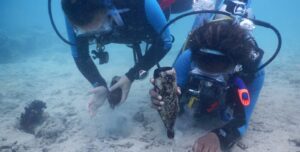Learn about the importance of employability skills in this article. Discover the top 12 employability skills that employers look for when considering potential hires.
GVI
Posted: August 5, 2023

GVI
Posted: February 1, 2023
Marine conservation is all about protecting our oceans and the life within them. Not only is it important for the planet, but it’s also a pretty awesome career choice. Not only will you get to work in some of the most beautiful and remote places on earth, but you’ll also be making a real difference in the world.
A career in marine conservation starts with a strong educational background in marine biology or a related field. Marine biology is the study of marine organisms, their behaviours, and their interactions with the environment. A degree in marine biology can open doors to a variety of careers, including:
Internships are a great way to gain hands-on experience in marine conservation and make connections in the field. Many organisations, such as GVI offer a wide range of marine conservation internships, from coral reef monitoring to sea turtle conservation, marine mammal research to sustainable coastal community development. These internships provide an opportunity to learn about the latest conservation techniques and technologies, gain experience working in the field, and make connections with professionals in the field.
Additionally, internships can provide students and recent graduates with the opportunity to:

Once you have a strong educational background, relevant experience, and a network of professionals in the field, it’s time to start looking for job opportunities. There are a number of ways to find job openings in marine conservation, including:
When applying for job openings, make sure to tailor your resume and cover letter to the specific position and organisation. Highlight your relevant education, experience, and skills, and demonstrate how they align with the organisation’s mission and goals. It is also important to make sure that your cover letter and resume stand out by making them visually appealing and easy to read.
Marine conservation is a fulfilling and rewarding career that offers many benefits for both individuals and the planet. To increase your chances of landing a job in the field, you should pursue a degree in marine biology or ecology, gain relevant experience through internships, network with professionals in the field, and stay informed about the latest developments in marine conservation. Joining a marine conservation internship with GVI is a great way to gain hands-on experience and make an impact on conservation efforts. With determination, hard work, and a positive attitude, you can secure a job in marine conservation and contribute to the protection of our oceans and marine life.
If you’re looking to dive deeper into the world of marine conservation and make a real difference in protecting our oceans, look no further than GVI’s marine conservation internships! They offer a variety of programs in countries like Belize, Fiji, Mexico, the Canary Islands, Greece, Seychelles and Thailand. These internships cover a range of topics such as marine mammal research, coral reef monitoring, sea turtle conservation, and sustainable coastal community development. Not only will you gain valuable hands-on experience and practical skills in the field, but you’ll also have the opportunity to immerse yourself in different cultures and make lasting connections with people from all over the world. An internship abroad is a one of a kind opportunity to gain international experience and make a real impact in the marine conservation field.

Learn about the importance of employability skills in this article. Discover the top 12 employability skills that employers look for when considering potential hires.
GVI
Posted: August 5, 2023